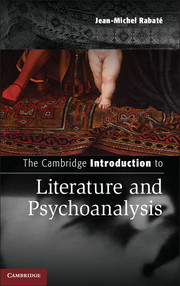Book contents
- Frontmatter
- Contents
- Acknowledgments
- Introduction
- Chapter 1 Freud’s theater of the unconscious
- Chapter 2 Literature and fantasy, toward a grammar of the subject
- Chapter 3 From the uncanny to the unhomely
- Chapter 4 Psychoanalysis and the paranoid critique of pure literature
- Chapter 5 The literary phallus, from Poe to Gide
- Chapter 6 A thing of beauty is a Freud forever
- Chapter 7 From the history of perversion to the trauma of history
- Conclusion
- Keywords and Index of Authors
- Bibliography
- Index
- References
Introduction
Why psychoanalysis matters
Published online by Cambridge University Press: 05 September 2014
- Frontmatter
- Contents
- Acknowledgments
- Introduction
- Chapter 1 Freud’s theater of the unconscious
- Chapter 2 Literature and fantasy, toward a grammar of the subject
- Chapter 3 From the uncanny to the unhomely
- Chapter 4 Psychoanalysis and the paranoid critique of pure literature
- Chapter 5 The literary phallus, from Poe to Gide
- Chapter 6 A thing of beauty is a Freud forever
- Chapter 7 From the history of perversion to the trauma of history
- Conclusion
- Keywords and Index of Authors
- Bibliography
- Index
- References
Summary
In the field of literary studies, to say that psychoanalysis has had bad press is an understatement. Even if it remains strong at the field’s margins, in film studies, in contemporary art history seminars, in queer studies, in trauma studies, in discussions of the Holocaust, in feminist and post-feminist approaches, in cultural critique and ideology critique following Lacanians such as Slavoj Žižek or neo-Marxist philosophers such as Alain Badiou or Jacques Rancière, when it comes to literature as literature, the invocation of Freud and disciples such as Marie Bonaparte, Oskar Pfister, Otto Rank, or Erich Fromm is most of the time a pretext for a good laugh before serious work begins.
Vladimir Nabokov has represented this tendency most forcefully, and he managed to summarize what he called the charlatanism of Freudians in just two quotes in Pale Fire: at one point, the mad commentator Kinbote quotes Oskar Pfister, who discussed the case of a young man who was unable to stop picking his nose, adding that he was obviously overcome by lust and knew no limits to his fantasies; he also quotes Erich Fromm who wrote that Little Red Riding Hood’s cap of red velvet was an obvious symbol of menstruation. It took a critic close to psychoanalysis such as Jeffrey Berman to point out that these observations were not as absurd in their original context. However, when we see such flat-footed systems of equivalences, we can only laugh.
- Type
- Chapter
- Information
- Publisher: Cambridge University PressPrint publication year: 2014

